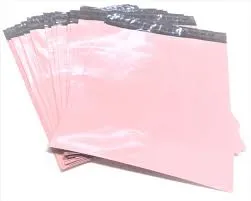High-Quality BOPP Laminated Non-Woven Bags for Durable and Eco-Friendly Packaging Solutions
The Rise of BOPP Laminated Non-Woven Bags A Sustainable Choice for the Future
In recent years, the environmental consciousness of consumers and businesses has dramatically increased, leading to a significant shift in packaging solutions across various industries. One of the most promising developments in this arena is the emergence of BOPP (Biaxially Oriented Polypropylene) laminated non-woven bags. These bags offer an eco-friendly alternative to traditional plastic bags and are gaining popularity due to their durability, versatility, and sustainability.
What Are BOPP Laminated Non-Woven Bags?
BOPP laminated non-woven bags are made from a composite of non-woven fabric and a layer of BOPP film. The non-woven fabric is typically produced from polypropylene fibers, which are bonded together using various methods, including heat or chemical processes. The addition of a BOPP lamination enhances the bags' strength, water resistance, and print quality, making them suitable for a wide range of applications.
These bags are available in various sizes and colors, making them ideal for retail, promotional, and packaging purposes. Their robust design allows them to carry heavy loads without tearing or breaking, setting them apart from conventional plastic bags.
Environmental Benefits
One of the primary advantages of BOPP laminated non-woven bags is their environmental friendliness. Unlike single-use plastic bags, which take hundreds of years to decompose, non-woven bags can be recycled and reused multiple times. Furthermore, the production process of non-woven bags typically consumes less energy compared to traditional plastic manufacturing.
Additionally, many companies are turning to biodegradable and compostable materials in conjunction with BOPP lamination, further enhancing the sustainability of these bags. By opting for BOPP laminated non-woven bags, consumers and businesses are taking a significant step toward reducing their carbon footprint and minimizing plastic waste.
Versatility in Applications
bopp laminated non woven bags

The versatility of BOPP laminated non-woven bags makes them suitable for various industries. In retail, these bags are increasingly used as shopping bags, providing a stylish and eco-friendly alternative for consumers. Many brands utilize these bags for promotional purposes, as they can be customized with logos and designs, turning them into effective marketing tools.
In the agricultural sector, BOPP laminated non-woven bags are utilized for packaging seeds and fertilizers. Their durability and breathable nature prevent moisture buildup, extending the shelf life of agricultural products. Similarly, in the food industry, these bags can be used for packaging snacks, grains, and organic produce, ensuring freshness and hygiene.
Economic Considerations
From an economic standpoint, BOPP laminated non-woven bags are often more cost-effective over the long term compared to traditional plastic bags. While the initial investment may be higher, their durability and reusable nature mean that consumers can save money by reducing the frequency of repurchase. Moreover, as governments around the world implement stricter regulations on plastic usage, the demand for sustainable packaging solutions like BOPP laminated non-woven bags is expected to rise.
Businesses that adopt these bags can also enhance their brand image by aligning with sustainable practices, attracting environmentally conscious consumers. This shift not only promotes a positive corporate reputation but can also lead to increased sales and customer loyalty.
Conclusion
The rising trend of BOPP laminated non-woven bags represents a significant leap forward in sustainable packaging solutions. Their combination of durability, versatility, and environmental benefits positions them as a frontrunner in the quest for eco-friendly alternatives to traditional plastic bags. As awareness about environmental issues continues to grow, embracing these reusable bags can be a fundamental step for businesses and consumers alike toward a greener future.
In conclusion, investing in BOPP laminated non-woven bags is not just a choice; it's a commitment to sustainability and responsible consumption. The future of packaging is undoubtedly leaning toward solutions that respect our planet, and these bags exemplify the positive changes that can be made through innovative materials and conscious choices.
-
Have the freedom of customizing your custom mailers any way you want! Our dedicated packaging support will help deliver you the mailing experience you need to elevate your shipping experience to the next level! Start making a strong impression on your customers and stand out from your competitors! -
LIYA uses high quality raw materials which directly purchased from large enterprises domestic and overseas such as PetroChina, Sinopec, Sabic, Equate, ExxonMobil, Dow Chemical, Total, and Borouge, ensuring the price advantage and quality of the raw materials. -
LIYA uses high quality raw materials which directly purchased from large enterprises domestic and overseas such as PetroChina, Sinopec, Sabic, Equate, ExxonMobil, Dow Chemical, Total, and Borouge, ensuring the price advantage and quality of the raw materials.





